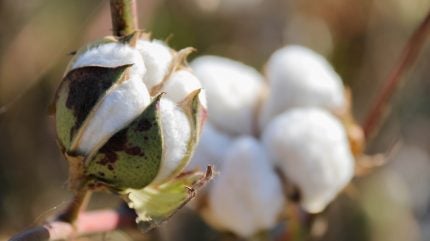
Aid by Trade revealed in its 2023 annual report that 900,000 small-scale farming families cultivated an area of 1.7m hectares of cotton under the CmiA and CmiA Organic standards’ criteria. Altogether, they produced 508,000 tonnes of CmiA and CmiA Organic lint cotton, which were then used to make textiles. CmiA was present in 54 textile production markets worldwide and worked with 2,700 partners in the textile supply chain,
Good Cashmere Standard (GCS), developed by Aid by Trade, collaborated with 54 retail companies and brands and was present in 16 textile production markets. In 2023, 9,100 farms in Inner Mongolia with 4.3m goats produced a total of 2,200 tonnes of GCS-verified cashmere, representing another year-on-year increase.
Sales under the labels of CmiA and GCS earned licensing revenue of €4.765m.
To increase small-scale farmers’ resilience to the effects of climate change, AbTF also developed the Regenerative Cotton Standard (RCS) in 2023. RCS follows a holistic approach to agriculture and distinguishes itself by being the first to specifically promote natural regenerative processes in small-scale cotton farming.
Aid by Trade managed to generate €8.1m in revenue despite economic difficulties affecting the textile sector which it attributed to its “strong market position.”

US Tariffs are shifting - will you react or anticipate?
Don’t let policy changes catch you off guard. Stay proactive with real-time data and expert analysis.
By GlobalDataThe foundation boosted its financial commitment by 23% year-on-year to support environmentally and socially responsible raw cotton and cashmere production. This growth also helped fund projects aimed at improving living conditions in production areas.
Professor Dr Michael Otto described the Aid by Trade Foundation and its standards purpose as playing a clear role in increasing the resilience of goat herders and cotton producers.
Almost all (84%) of the foundation’s income in 2023 came from commercial operations, which supported nearly 900,000 smallholder families farming 1.7m hectares to produce around 500,000 tonnes of cotton under CmiA and CmiA Organic Standards. Additionally, 9,100 farms in Inner Mongolia, raising 4.3m goats, produced 2,200 tonnes of GCS-verified cashmere— a 15% increase from the previous year.
Integrating traditional knowledge with modern agricultural technology and effective tracing systems, like the Hard Identity Preserved (HIP) tracking system, provided the innovative impetus producers call for, all while reliably delivering the high transparency level increasingly demanded by lawmakers, retailers, brands, and consumers.
Aid by Trade explained “Regional workshops, digital learning platforms, and innovations like the remote sensing project or the recently established Innovations Club are only a few of the ways through which AbTF led the way in 2023, providing clear measures, guidelines, and data-based approaches for partner organisations to build on as they work to responsibly produce raw materials for the textile industry.”



